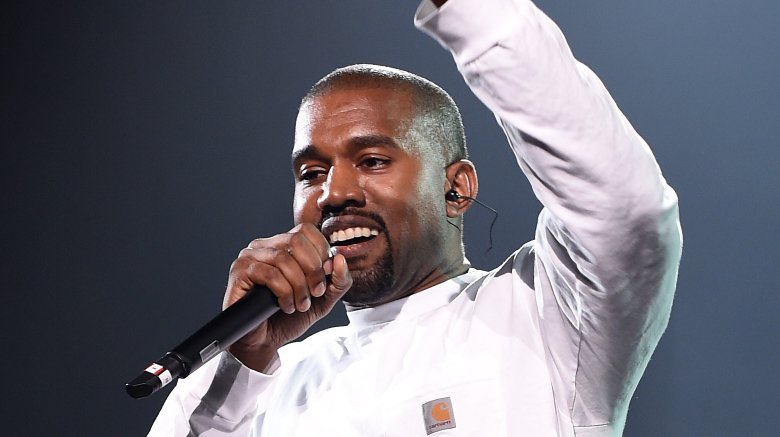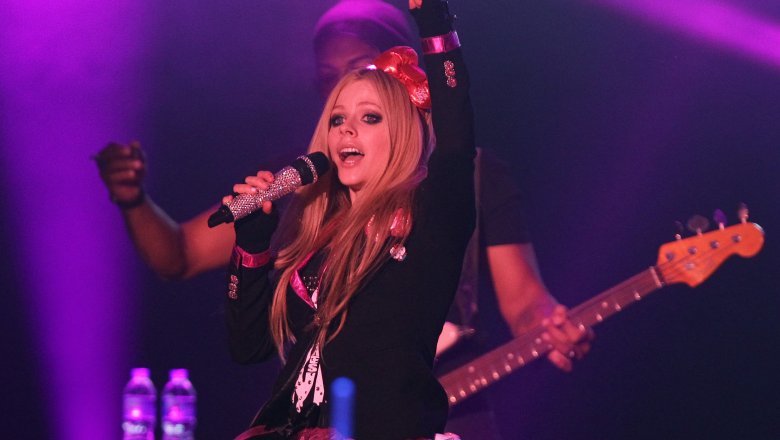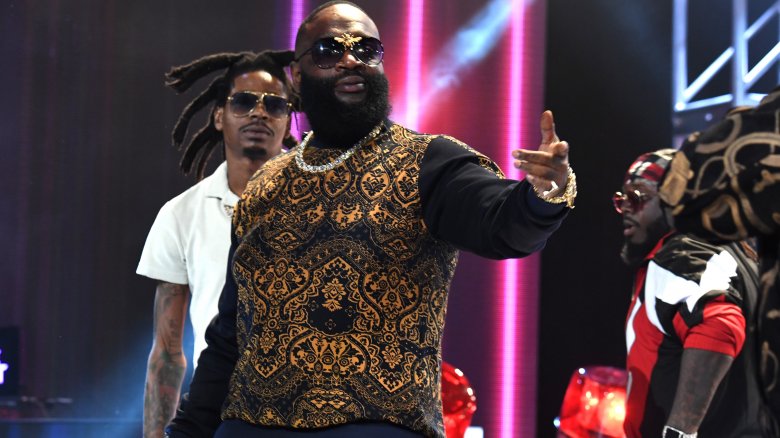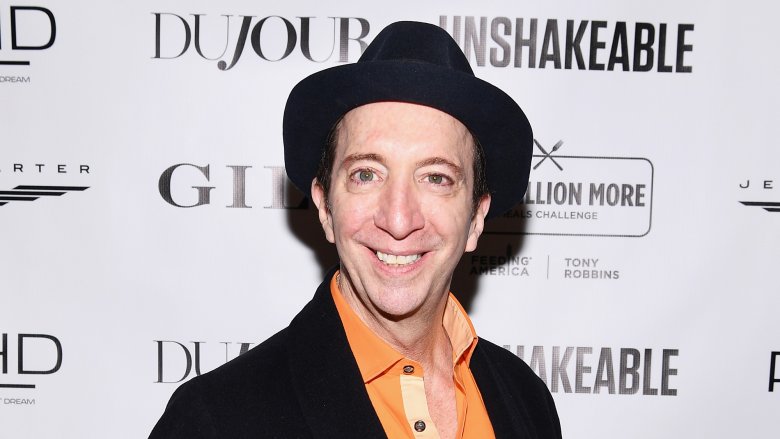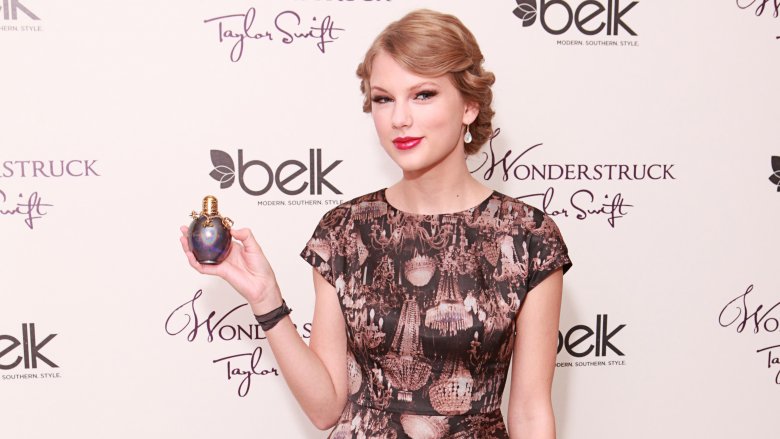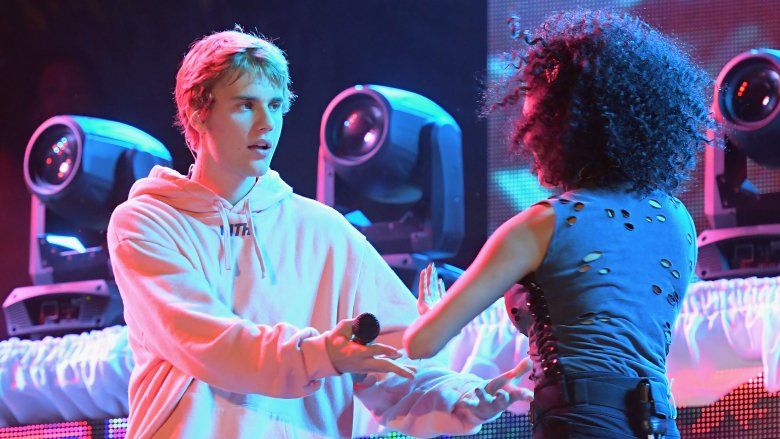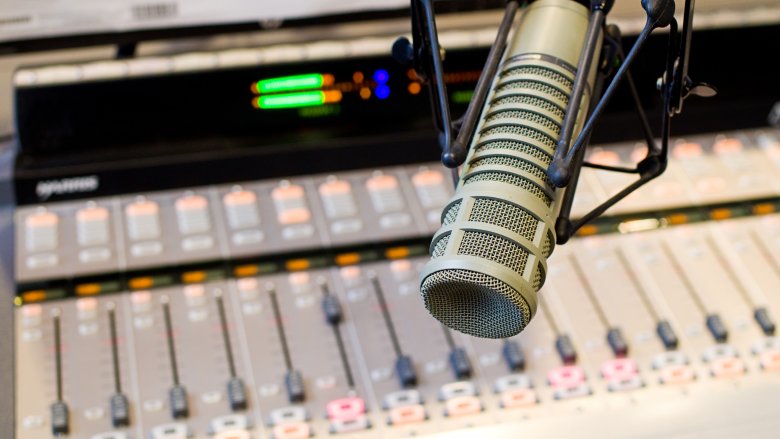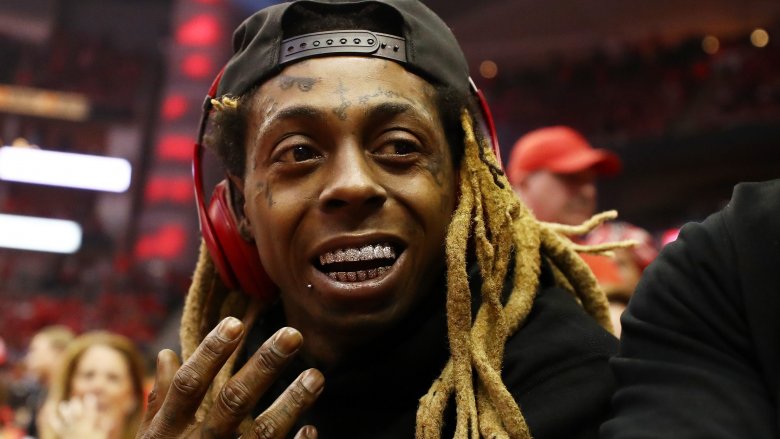Secrets Famous Musicians Don't Want You To Know
Musicians, especially the pop star variety, are among the most ubiquitous celebrities on the planet. Their music is everywhere, their faces are everywhere, and their lives are seemingly perfect at all times. After all, they get paid untold gobs of money to sing pretty songs. If that isn't the ultimate dream job, what is?
As it turns out, however, there's a lot about the musician life that might make you want to think twice before stepping into that recording studio and becoming the next Justin Bieber or Taylor Swift or Gerardo. Documentaries like VH1's Behind The Music have already educated us about musicians and drugs going together like peanut butter and jelly, but there's a lot more going on in a musician's life and career. Many of these things the stars would prefer you know nothing about. Here are some secrets musicians would rather you ignore in favor of watching them gyrate on stage.
Many don't write their own songs
Most musicians want you to think they write songs entirely by themselves, or played a very heavy part in creating them. The sad truth is, many write next to nothing, and their byline exists simply for phony artistic cred. Also, to get paid.
As CBS News points out, it's apparently common, unspoken practice for stars to claim co-writer status when they hardly contributed anything to the writing process. Oftentimes, the singer merely contributes one or two words, which technically makes them a co-writer. That's like adding a sprig of parsley to a Gordon Ramsay recipe and expecting one of his Michelin stars.
Sometimes, they don't even bother with that much effort. As singer-songwriter Dallas Austin recounted, a star's manager once asked Austin if his star could record Austin's song and receive co-author credit. The star wasn't going to rewrite — they simply wanted to look artistic and score some royalties.
Austin didn't name names, but others have. Songwriter Chantal Kreviazuk accused Avril Lavigne of writing little that she's been credited for. She later walked those claims back, but it's a little late for that. Then there's Lauryn Hill, who got sued by the songwriting team that helped her put together 1998's The Miseducation of Lauryn Hill. Her label credited Hill as writing most everything by herself, which the lawsuit claimed simply was not the case. They later settled out of court, but as with Avril, smoke usually suggests fire.
Many musical personas are fake
Few things hurt a musician's reputation more than not being perceived as real or genuine. So many stars will craft as "real" a persona as possible, even though doing so makes them fake as can be.
This happens in all genres, from country stars pretending to be down-to-Earth rednecks to metal bands pretending to be dark and evil. Slayer acts like Satan-worshipping, death-obsessed maniacs, when in truth their singer is a practicing Catholic. One of their songs may be sarcastically called "Jesus Saves," but he actually believes it.
Fake personas may be most egregious in hip-hop, a genre obsessed with realness. Take someone like Rick Ross, a former prison guard named William Roberts, reinventing himself as an ex-cocaine boss. In truth, he "borrowed" that origin story from an actual drug dealer named Rick Ross. As The Independent reported, the real Ross sued the fake Ross for $10 million, which proved unsuccessful because apparently impersonation of a drug dealer is not a crime.
Rapper Akon got caught lying about his past, when The Smoking Gun revealed his backstory of being the kingpin of a car theft ring and serving years in prison was an outright lie. Then there's Roxanne Shante, who claimed she forced her record label to pay for her PhD. In truth, as Slate discovered, not only did they not do that, she barely went to college at all. It was just another tall tale designed to sell albums and tickets.
Labels buy their own songs to make them chart
You've probably wondered why certain songs, despite being the worst assault on ears this side of an icepick, somehow topped the sales charts. As it turns out, it might be due to record labels being their own best customer.
A Wired interview with Tom Silverman (above), president of Tommy Boy Records, claimed labels make stars seem more popular than they really are by downloading their songs by the truckload. This drives up sales numbers, putting their stars in a top spot and causing more sales, which equals more money for everyone involved.
According to Tom, labels might initially lose some money in such a process, but not as much as you might think — maybe only about 30 percent of the purchase price. Plus, now that they've made it seem like their artist's music is must-own, more money will come pouring in.
Such blatant book-cooking exists, Tom claims, because it has to. Thanks to the internet, iTunes and similar sites are absolutely drowning in music, most of which absolutely nobody cares about. A superstar's material can get lost in the shuffle. At the very least, conducting such a practice over the internet sounds ways easier than walking into a record store and buying up all the copies of your clients' album, like in prehistoric times.
Many of them make money through anything but music
If your goal is to make money from music, here's a reality check: It's probably not gonna happen. Thanks to downloading and streaming, virtually no musicians make money simply from writing, recording, and releasing music. Instead, be prepared to make your fortune through many other routes, some of which aren't glamorous in the least.
Obviously, plenty of musicians make their money by touring, but for many that simply isn't enough. If you put on a high-budget show, for example, you're probably not pocketing much for yourself at the end. That's why, as the Telegraph notes, you see so many pop stars shilling their own lines of perfume, cologne, clothing line, or anything else beyond a simple T-shirt with the artist's picture on it. They don't really care if you smell good — they just want to pay their bills.
That all said, probably the most lucrative way for musicians to make money is perhaps the least brag-worthy one: going somewhere, standing there, and being seen. There's a lot of money in stars making promotional appearances for whatever brand wants them. Their star presence makes the brand look better and cooler, and they compensate the star well for the endorsement. Depending on how big they are, they can get anywhere from four to six figures simply for hanging out at a party and pretending to like whatever the company wants to sell their fans.
Songwriters make almost no money from streams
It's well-documented that the rise of streaming, and the decline of people willing to pay anything for music has affected musicians greatly. But what they're going through is nothing compared to those who've been most devastated by the lack of funds: the song writers.
If your only job is to write songs for other people to sing, you might as well do that for free at this point. According to Pacific Standard, songwriters are among the only people in the industry who've never formed a legitimate union, so the internet age has hit them the hardest. They can expect to make, if they're lucky, about half a penny per stream of a song they wrote.
A pure songwriter named Andre Lindal, who wrote Justin Bieber's smash hit "As Long As You Love Me," made a mere $218 off 34 million YouTube hits. Over on Pandora, despite 38 million streams of the song, he pocketed a paltry $278. For having his song reach people's ears 72 million times, he barely earned enough to afford a single monthly payment on a 2-year-old car.
And virtually nobody wants to pay a songwriter to sell perfume or chill to a party. Their only source of income is royalties from the music they write. Well, that and picking up as many extra Walmart shifts as they can.
Radio payola still exists, but under a different name
You've probably heard of payola. The act of record labels paying radio stations to play their songs ad nauseam went out of style in the late 1950s, when Congress made it so radio stations must disclose if they're getting paid to play a song. No station worth their sweepers wants to do that, but they're still cool with taking money for constant airplay. They just do it differently now.
The modern method, as explained by Salon, involves secret middlemen called independent promoters. Record labels pay the indies, who then offer the radio stations "promotional bonuses" in exchange for playing the label's songs. Since it's not technically payola because they've added a middleman, the stations don't have to disclose anything. So while that hot new Shawn Mendes or Camila Cabello track may be popular among the kids, it might be largely due to labels paying through the nose to make it happen.
Don't think you're safe just because you don't listen to the radio — streaming sites like Pandora are just as bad. In 2014, as Future of Music reported, Pandora inked a deal with Merlin, a company that owns tons of rights to tons of independent music. This deal involved Pandora changing its algorithms to allow more music owned by Merlin, in exchange for lower rates. Keep that in mind next time you're wondering why, despite untold millions of songs to choose from, even Pandora plays the same few ditties time and again.
Many music 'beefs' are probably staged for publicity
Most musician "feuds" are about as genuine as pro wrestling feuds, cooked up to sell albums or simply to remind everyone the musicians exist.
50 Cent and Kanye West had a long-running beef, but to hear fellow hip-hopper Reverend Run tell it, they were acting from the start. The two often released music around the same time so, according to Ron, their squabbling existed entirely to promote their work. There was about as much real animosity as two coworkers trying to win "Salesman of the Month."
Remember Beyonce's sister Solange Knowles confronting Jay-Z in an elevator, perhaps as revenge for Jay cheating on Bey? Well, according to the ladies' father, Matthew Knowles, that was staged melodrama from the start. There was a tour coming up, so the clan staged what Knowles called a "Jedi mind trick," which got everybody in the news, boosted tour exposure, and increased Solange's album sales by over 200 percent. Yoda likely wouldn't approve of using the Force in such a money-grubbing manner.
Fake feuds can also introduce us to new people. In the '90s, teen R&B sensations Brandy and Monica were here one day, feuding the next. Years later, Monica admitted to a radio station their drama was a label-authored storyline, cooked to launch them into the spotlight. Apparently, it wasn't enough to pretend-feud over a boy in a duet – they had to actually feud to truly sell the song. After all, it's about being real.
Their tour buses constantly get stopped for drugs
If you ever become a rock star, don't enter your new life thinking your tour bus will be some kind of safe haven. Far from it — thanks to your drug-happy rockers giving their peers a reputation, tour buses are a favorite target of cops looking to score that big drug bust that could get them a promotion, and perhaps a spot on the news.
The list of musicians whose tour buses have been stopped and investigated for drugs is a long and winding one. To name a few: Lil' Wayne had his bus busted in 2009, Swedish cops invited themselves onto Justin Bieber's bus in 2013, a norteno band called Zinzzero saw eight of their crew arrested after cops found an insane 630 pounds of cocaine on it, hip-hopper Dappy had his bus raided in February 2018, and later that year police arrested a crew member of the rap group Migos, after a police raid detected drugs.
That's not even including the bevy of bus busts that have occured at the Sierra Blanca, Texas, border stop. Fiona Apple, Willie Nelson, Snoop Dogg, and Nelly are just some of the names that rolled through this otherwise-sleepy Texas town and left with an unexpected mugshot for their portfolio. Since so many of these raids wind up with cops actually finding drugs, expect this practice to continue unabated.
Their music is almost entirely formula-driven
Musicians want their fans to think their music is 100 percent original and unique to their artistic vision. In truth, much of it is created almost completely by proven, by-the-numbers formulas — cold algorithms designed entirely to churn out hits.
As the Washington Post pointed out, a huge majority of rock/pop songs follow most, if not all, of the same guidelines. Most are in 4/4 time, in one key, last no more than five minutes, repeat the title, and feature hooky, repetitive riffs. While it's certainly possible to make a song your own while writing within those guidelines, it's still less an artist creating something from nothing, and more their tweaking something that already exists just enough so nobody sues for plagiarism.
In 2011 and 2012 the University of Bristol's Intelligent Systems Laboratory and the Spanish National Research Council looked at chart-topping songs from the past 50 years, trying to uncover trends. They found plenty: Harmonies and rhythms are simple and straightforward, instruments have been digitized to the point where their "timbres" (overall sounds) are increasingly indistinguishable from completely unrelated instruments, and chord progressions are generally simple and extremely similar from song to song. There's a reason why you can mash together all kinds of hits from the last few decades and have it sound just fine – because they're not that different.
They're deeply in debt to their labels
Being a rock star often means being deeply in debt to your label almost literally from the start, in case you needed one more reason to burn your guitar.
Courtney Love penned an essay for Salon in 2000, outlining how inevitable it is for a musician to fall into debt. Basically, the label gives an artist an advance, they spend X amount to record an album, then the rest goes to management, lawyers, taxes, and finally themselves. It's possible to be advanced a million dollars and see under 50 grand of it, and that's before the parties.
Also, that initial advance is recoupable, meaning the label wants it back. They can also recoup any money provided for touring and video-making. At this point, the star could be millions in the hole, money they'll likely pay back through royalties and touring. Hitting the road to honor new debt probably isn't why most people dream of getting into music.
It's not just Love — in 2008, EMI sued 30 Seconds To Mars for $30 million. But according to the band, EMI never paid them any royalties and the band actually still owed them $1.4 million. EMI somehow interpreted this as having to force Mars into paying them much more. (The two sides settled a year later.) Meanwhile, country star Lyle Lovett told Billboard in 2008 he's earned no money from selling 4.6 million albums in his career. If you want to make money in music, playing the music clearly isn't the route to take.
